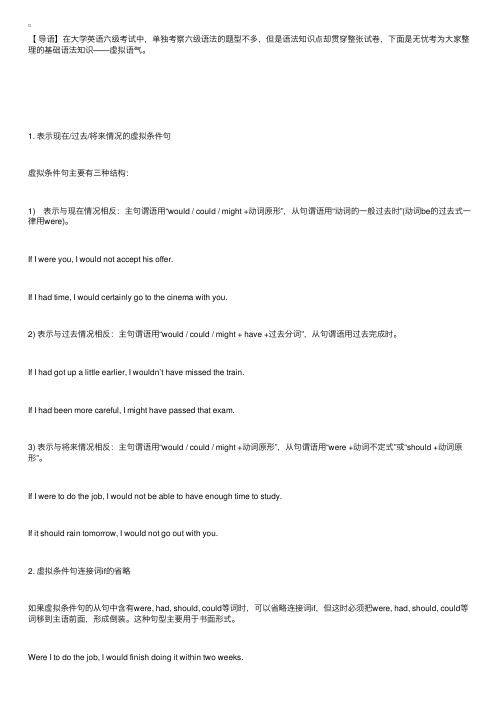虚拟语气入门之虚拟条件句
- 格式:ppt
- 大小:1.24 MB
- 文档页数:35

虚拟语气(整理版)虚拟语气定义:虚拟语气指不行能实现的愿望或与事实相反的状况,而不表示客观存在的事实。
大致可分为以下几种状况:一、虚拟条件句(Unreal conditions)(一)含有if条件句的主从句的虚拟语气总结:1. If条件句中谓语动词的虚拟结构是在本来陈述语气所用时态的基础上倒退一个时态(对未来虚拟的were to do/should do例外)2. 主句要借助于情态动词的过去式,后跟动词原形(现在或未来)或have done(过去);if条件句中只浮现一个情态动词,即对未来虚拟的should.3.做此类题目时一定要分清是从句还是主句谓语动词的虚拟,还要掌握好时态。
注重:1. 在虚拟条件从句中,动词“be”的过去时态一律用”were”,不用was。
2. 在虚拟条件状语中假如有were, should, had这三个词中任何一个,可省略if,把这三个词提到主语提之前, 变成:were/should/had +主语+剩余成分。
3.在虚拟条件状语从句中,省略连词的倒装形式的句首不能用动词的缩略形式。
如我们可说Were I not to do., 而不能说Weren…t I todo。
4.在表示与未来事实相反的条件句中,只能用should,而不能用would,could和might 等。
5.主句中的should通常用于第一人称,would,could以及might 可以用于各种人称(二)混合虚拟条件句当假设条件句的主句和从句不表达同一时光的时候,我们应使用混合时光的假设条件句,动词的形式要分离按照它所表示的不同时光做相应的调节,变法同if条件虚拟句的主从句谓语动词变法。
(三)含蓄条件句在含蓄条件句中,我们常使用otherwise ,or, but以及with ,without ,but for开头的介词短语来代替条件句。
注:1. but for =1)If it weren’t fo r(对普通现在时虚拟)2)If it hadn’t been for(对普通过去时虚拟)2.分句(直陈)+otherwise/or+分句→对主句谓语动词的虚拟3.分句(对主句谓语动词虚拟)+but/unfortunately+分句(直陈)4.with/without/but for+宾语+句子(对主句谓语动词虚拟)填空:1. 假如现在不下雨的话, 我们就出去野餐了。


【导语】在⼤学英语六级考试中,单独考察六级语法的题型不多,但是语法知识点却贯穿整张试卷,下⾯是⽆忧考为⼤家整理的基础语法知识——虚拟语⽓。
1. 表⽰现在/过去/将来情况的虚拟条件句虚拟条件句主要有三种结构:1) 表⽰与现在情况相反:主句谓语⽤“would / could / might +动词原形”,从句谓语⽤“动词的⼀般过去时”(动词be的过去式⼀律⽤were)。
If I were you, I would not accept his offer.If I had time, I would certainly go to the cinema with you.2) 表⽰与过去情况相反:主句谓语⽤“would / could / might + have +过去分词”,从句谓语⽤过去完成时。
If I had got up a little earlier, I wouldn’t have missed the train.If I had been more careful, I might have passed that exam.3) 表⽰与将来情况相反:主句谓语⽤“would / could / might +动词原形”,从句谓语⽤“were +动词不定式”或“should +动词原形”。
If I were to do the job, I would not be able to have enough time to study.If it should rain tomorrow, I would not go out with you.2. 虚拟条件句连接词if的省略如果虚拟条件句的从句中含有were, had, should, could等词时,可以省略连接词if,但这时必须把were, had, should, could等词移到主语前⾯,形成倒装。
这种句型主要⽤于书⾯形式。

虚拟语气分三种情况来掌握:1、虚拟条件句。
2、名词性虚拟语气。
3、虚拟语气的其他用语。
一、虚拟条件句:条件状语从句是非真实情况,在这种情况下要用虚拟语气。
1、条件从句与现在事实不一致,其句型为:If 主语+过去时,主语+should(could, would,或might)+动词原形,如:If I were you, I wouldstudyhard.If it rained, I wouldnot be here now.2、条件从句与过去事实不一致,句型为:If 主语+had+过去分词,主语+should(could, would,或might)+have+过去分词,如:If the doctor had come last night, the boy wouldhave saved.If I had not studie d hard, I wouldhave failed in the exam last term.3、条件从句与将来事实不一致,句型为:+do,主语+should(could…)+原形do过去时(与现在事实条件句一样)。
If it should rain tomorr ow, we wouldstay at home.If I were to go to the moon one day, I couldsee it with my own eyes.If you missed the film to night, you wouldfeel sorry.注意问题:1、If条件句中绝对不可出现“would”。
2、根据句中的时间状语,有时可能出现“混合虚拟”的情况,即主句可能是现在的情况,条件句也许是发生在过去的情况,但都是遵守上述句型。
3、在条件句中如果出现we re, had, should可省去if,将主语与这些词倒装,例如:Had the doctor come last night, the boy wouldhave saved.Were I to go to the moon one day, I wouldsee it with my own eyes.Should it rain tomorr ow, we wouldstay at home.二、名词性虚拟语气:在表示命令、建议要求、惊叹时的名词性从句中需用虚拟语气,基本句型:主语+(should)+动词原形,如:Mother insist ed that John go to bed at 9 o’clock.(宾语从句)We sugges ted that the meetin g should not be held.It was requir ed that the cropsshould be harves ted at once.(主语从句)The sugges tionthat he be invite d was reject ed.(同位语从句)That is theirdemand that theirwagesbe increa sed.(表语从句)注意:在这种句子中绝不出现“would”“must”“could”等。

虚拟语气分三种情况来掌握:1、虚拟条件句。
2、名词性虚拟语气。
3、虚拟语气的其他用语。
一、虚拟条件句:条件状语从句是非真实情况,在这种情况下要用虚拟语气。
1、条件从句与现在事实不一致,其句型为:If 主语+过去时,主语+should(could, would, 或might)+动词原形,如:If I were you, I would study hard.If it rained, I would not be here now.2、条件从句与过去事实不一致,句型为:If 主语+had+过去分词,主语+should(could, would, 或might)+have+过去分词,如:If the doctor had come last night, the boy would have saved.If I had not studied hard, I would have failed in the exam last term.3、条件从句与将来事实不一致,句型为:+do,主语+should(could…)+原形do过去时(与现在事实条件句一样)。
If it should rain tomorrow, we would stay at home.If I were to go to the moon one day, I could see it with my own eyes.If you missed the film to night, you would feel sorry.注意问题:1、If条件句中绝对不可出现“would”。
2、根据句中的时间状语,有时可能出现“混合虚拟”的情况,即主句可能是现在的情况,条件句也许是发生在过去的情况,但都是遵守上述句型。
3、在条件句中如果出现were, had, should可省去if,将主语与这些词倒装,例如:Had the doctor come last night, the boy would have saved.Were I to go to the moon one day, I would see it with my own eyes.Should it rain tomorrow, we would stay at home.二、名词性虚拟语气:在表示命令、建议要求、惊叹时的名词性从句中需用虚拟语气,基本句型:主语+(should)+动词原形,如:Mother insisted that John go to bed at 9 o’clock.(宾语从句)We suggested that the meeting should not be held.It was required that the crops should be harvested at once.(主语从句)The suggestion that he be invited was rejected.(同位语从句)That is their demand that their wages be increased.(表语从句)注意:在这种句子中绝不出现“would”“must”“could”等。

虚拟语气语气(mood)也是动词的一种形式变化。
这和中文中的语气是不一样的。
它表示说话者对所指的动词或状态所持的态度,而且,在谓语动词上有所体现,而中文没有体现。
语气可分为三种:陈述语气、祈使语气和虚拟语气。
虚拟语气(the Subjunctive Mood)表示说的话不是事实,或者是不可能发生的情况,而是一种愿望、建议或与事实相反的假设等。
一、虚拟条件句1.主句和从句都与现在事实相反时,从句用一般过去时,be的形式要用were,主句用would/could/ should/might+不定式一般式。
If I were you, I should not go with him.2.主句和从句都与过去事实相反时,从句用过去完成时,主句用would/should/could/might+不定式完成式。
If I had tried hard last term, I would have succeeded.3.当主句和从句都与将来事实相反,或指不大可能发生的事的时候,从句和与现在事实相反的从句时态相同,或用should/were to+不定式一般式,主句和与现在事实相反的主句相同。
If it rained/were to rain/should rain tomorrow, the match would be put off.4.在使用虚拟条件句时,由于语言环境的千差万别,各种时间关系混合使用是很常见的。
如果逻辑上讲得通,主句和从句的动词时态可进行各种各样的搭配。
If it hadn't rained those days, (从句与过去事实相反)1 work would be finished next week. (主句与将来事实相反)2.here wouldn't be any water in the river now. (主句与现在事实相反)一、语气及其种类1.语气(mood)语气是一种动词形式,表示讲话人对某一行为或事情的看法和态度。
虚拟语气一、虚拟条件句条件句分两种:一种是真实条件句,一种是虚拟条件句。
虚拟条件句,即指在一个虚拟假想的条件下来描述说话人想象的、非真实的情景,这些情景是不可能发生的,与客观事实相反。
在这种条件句中,从句和主句都要用虚拟语气。
虚拟条件句一般用if,unless (if not),If I had enough money, I would go to the zoo with you.If I had had enough money, I would have gone to the zoo with you.If I should have enough money, I would go to the zoo with you.If you were to examine the birth certificates of every soccer player in 2006’s World Cup Tournament, you would most likely find a noteworthy quirk: elite soccer players are most likely to have been born in the earlier months of the year than in the later months.If railroads charged all customers the same average rate, they argue, shippers who have the option of switching to trucks or other forms of transportation would do so, leaving remaining customers to shoulder the cost of keeping the line.on my mother’s going to Florida, she would be alive today.”三、would rather引导的宾语从句的虚拟用法would rather意为“宁愿、宁可”,其后的宾语从句用虚拟语气。
虚拟语气讲义1.虚拟语气句型1If + were/ did/ (动词的过去式), 主语+would/ might/ should / could + do 。
(表示对现在的假设)eg. If I were you, I would not be so proud . 如果我是你,我不会如此自负.eg. I don’t have a cellphone. If I had one , it would be convenient for me to get in touch with others 我没有手机,如果我有手机的话,和别人联系就方便的多了。
eg. If I were in your position, I would think better of it .如果我处在你现在的境地,我会重新考虑然后放弃。
2. 虚拟语气句型2If + had done, 主语+would/ might/ should / could + have done表示对过去或已经发生事情的虚拟假设。
eg. What a pity it is that you didn’t attended the concert yesterday! If you had attended the concert, you would have seen the famous singer.真遗憾你昨天没有去听音乐会。
如果你去了,你就会见到那位名歌手。
eg. Anyone in his position would have done the same= If anyone had been in his position, he would have done the same.3. 虚拟语气句型3If + were/ did(动词过去式)/should/ were to do , 主语+would/ might/ should / could + do (表示对将来的假设).eg. If he should refuse (= if he were to refuse = if he refused ), it wouldn’t matter 万一他拒绝了. 那也没有什么关系.eg. If you shouldn’t pass the college entrance examination, what would you do?万一你高考不中,你该怎么办?4. 虚拟语气条件句的倒装在虚拟条件句中,如果出现有were, had, should,可省去if,可将主语与这些词倒装,构成虚拟倒装句。
语法虚拟语气中的虚拟条件句虚拟条件句是英语语法中的一个重要部分,它用于表示与事实相反的假设或虚构情况。
在虚拟条件句中,我们使用虚拟语气来表达假设或可能性。
本文将介绍语法虚拟语气中的虚拟条件句的用法和例子。
一、虚拟条件句的基本结构虚拟条件句通常由两个部分构成:条件从句(if-clause)和结果从句(main clause)。
条件从句中使用了虚拟语气,结果从句则表示与事实相反的情况。
虚拟条件句的基本结构如下:1. 条件从句:使用过去完成时(had + 过去分词)或过去时(simple past)的虚拟语气形式。
2. 结果从句:使用 would / could / might + 动词原形。
二、虚拟条件句的类型虚拟条件句可以分为三种类型:虚拟条件句类型一(对过去情况的虚拟假设),虚拟条件句类型二(对现在情况的虚拟假设)和虚拟条件句类型三(对将来情况的虚拟假设)。
1. 虚拟条件句类型一(对过去情况的虚拟假设):如果条件从句是对过去情况的虚拟假设,我们使用过去完成时的虚拟语气形式,结果从句可以使用 would / could / might + 动词原形。
例如:- If I had studied harder, I would have passed the exam.(如果我当时学习更努力,我就能通过考试了。
)- If you had told me earlier, I could have helped you.(如果你早点告诉我,我本可以帮你的。
)2. 虚拟条件句类型二(对现在情况的虚拟假设):如果条件从句是对现在情况的虚拟假设,我们使用过去时的虚拟语气形式,结果从句使用 would / could / might + 动词原形。
例如:- If I were you, I would take the job offer.(如果我是你,我会接受这个工作机会的。
)- If she had more free time, she could help us with the project.(如果她有更多的空闲时间,她可以帮助我们完成这个项目。
虚拟语气的用法和注意事项虚拟语气是指在表达假设、愿望、建议、命令等非真实情况时所使用的一种语气。
它能够帮助我们表达一些与现实情况相反或者未实现的想法。
在日常生活和学术写作中,正确地使用虚拟语气将使我们的语言更加准确、严谨。
本文将介绍虚拟语气的常见用法,并提供一些需要注意的事项。
一、虚拟语气的用法:1. 虚拟条件句:虚拟条件句用来表达与现实相反或未实现的假设情况。
其中,谓语动词常用“would”或“should”来表示假设的情况。
例如:- If I were a bird, I would fly in the sky.(如果我是一只鸟,我就会在天空飞翔。
)- If it hadn't rained, we should have gone for a picnic.(如果没有下雨,我们本来会去野餐。
)2. 虚拟愿望句:虚拟愿望句用来表达一种未实现的愿望或者希望。
常用动词如“wish”,“hope”,“desire”等。
例如:- I wish I could speak fluent French.(我希望我能够流利地说法语。
)- She desires that her parents would understand her better.(她希望她的父母能更好地理解她。
)3. 虚拟建议句:虚拟建议句用来表达建议、要求等非真实情况。
常用动词如“suggest”,“recommend”,“request”等。
例如:- I suggest that he go to bed early to get enough rest.(我建议他早点睡觉以获得足够的休息。
)- The boss requested that all employees be punctual for the meeting.(老板要求所有员工在会议上准时到达。
)二、虚拟语气的注意事项:1. 在虚拟条件句中,如果假设是与现在事实相反的情况,谓语动词用过去式;如果假设是与过去事实相反的情况,谓语动词则用过去完成式。